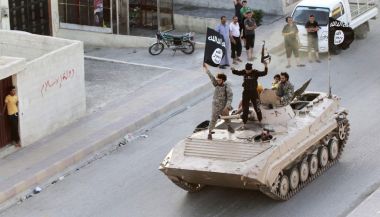'ISIS are threatening Christians all the time' says family member of abducted Assyrian Christian

A family member of one of the Christians abducted by Islamic State has told Christian Today that ISIS 'wants to horrify people' and that the militant group is a constant threat.
IS jihadists carried out dawn raids in a number of villages near Tel Hmar, south of the Khabour river, on 23 February. As many as 200 people are now thought to be being held captive.
Aryo Edward, a journalist originally from Kharbour who leads the Assyrian Human Rights Network, has family in Tal Shamiram, one of the villages which was attacked.
His wife phoned her cousin who lives in the village yesterday, but a member of IS picked up the phone. "My wife asked 'Where is my cousin? And he [the IS militant] said this is not his house any more, this house is for ISIS," Edward told Christian Today.
"The town was attacked so early in the morning that people were sleeping and didn't have time flee or run away...they [IS] entered the houses, and not only kidnapped people but took over their properties."
Sources told the Syrian Observatory for Human Rights (SOHR) that they heard militants over wireless devices confirming they had detained "56 crusaders" from Tal Shamiram.
Dozens of Assyrian people were also reportedly abducted from the village of Tal Hermez, and between 70-100 women and children are thought to have been taken, though some reports put the total number at up to 200.
SOHR's network of sources also said two people were executed by militants for "dealing with Kurds" in the nearby village of Ghibsh.
The reported abductions have been confirmed by campaign group A Demand for Action (ADFA), which is working to protect and support Assyrians, Chaldeans and Syriacs in Iraq and Syria.
IS militants attacked the villages at around 5am on Monday, displacing an estimated 3,000 people, the group has confirmed. Those kidnapped were mostly women and children, while men were taken to the Abd al-Aziz mountains.
The women and children are now believed to be being kept in Tal Shamiram, guarded by IS militants who are demanding a prisoner exchange with Kurdish fighters. They have threatened to kill the captured men if the swap does not go ahead.
At least 10-12 of the men taken were part of the Syriac Military Council, known also as MFS, which has joined the Syrian Kurdish militia in the fight against IS. On Sunday, the groups claimed to have driven IS out of over 20 villages between Hassakeh and the Turkish border. Yesterday's attack is thought to be a counter-drive by Islamist militants.
A journalist in Khabour told ADFA that a church had been burnt down in the village of Qabr Shamiye, and around 600 families have been forced to take refuge with relatives in cities such as Hassakah and Qamishli.
Iraqi activist Steven Nabil tweeted that one of the oldest churches in Syria has also been destroyed in Tel Hurmiz, along with the Mar Bisho church in Tel Shamiran and the church in Tel Baloua.
The churches were burned "because they [IS] wanted to horrify people," Edward told Christian Today.
ADFA also says it has called the mobile phones of those taken hostage, but IS militants answered them and "told us that we should not call any longer since we cannot do anything about their situation".
Edward said Assyrian Christians in the region have been targeted by IS in the past. Recently one village was told to remove the cross from its church – "ISIS are threatening them all the time".
The situation is still unfolding, but Kurds in the region "are fighting hard to defeat ISIS," he added.
The militant group is trying to reach Tel Temir, which is known locally as the "Capital of the Assyrians" as it is the main town for the Christian minority, Edward said. The city sits on a road that joins several key towns and leads to Aleppo. It also has a bridge – one of the only ones in the region – thus making it a strategic target.
Many of those displaced by yesterday's attack are now sheltering in churches. An Assyrian friend of Edward is helping those taking refuge in Hassakeh's St Mary's church.
"She said to me, 'These people have been worshipping [God] in this region for 2,000 years. Why did God not help us?'. Some people are losing their faith...how did this happen?"











